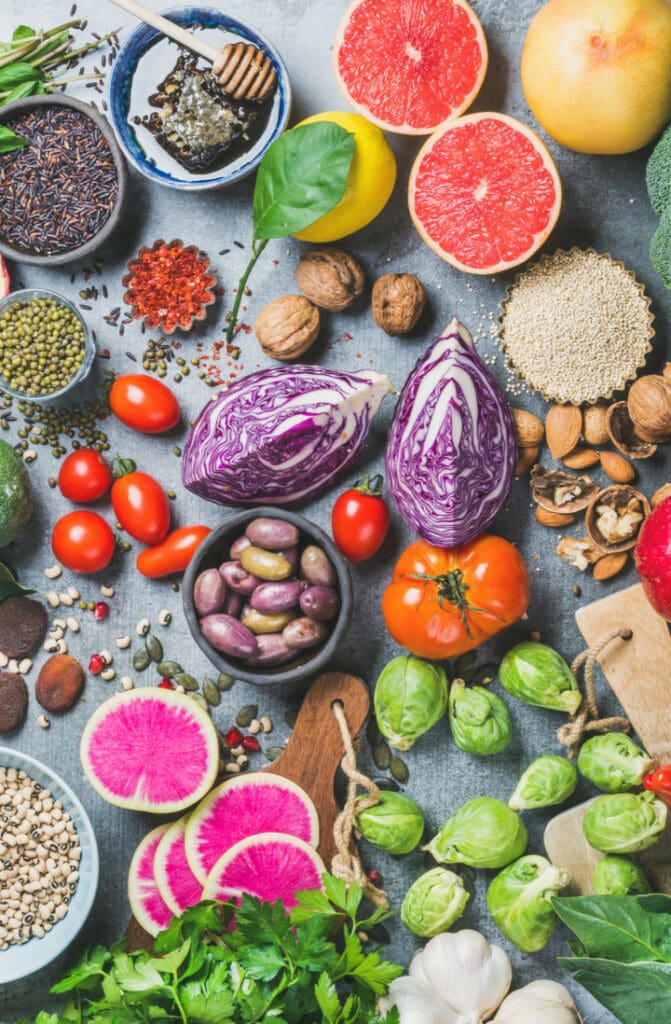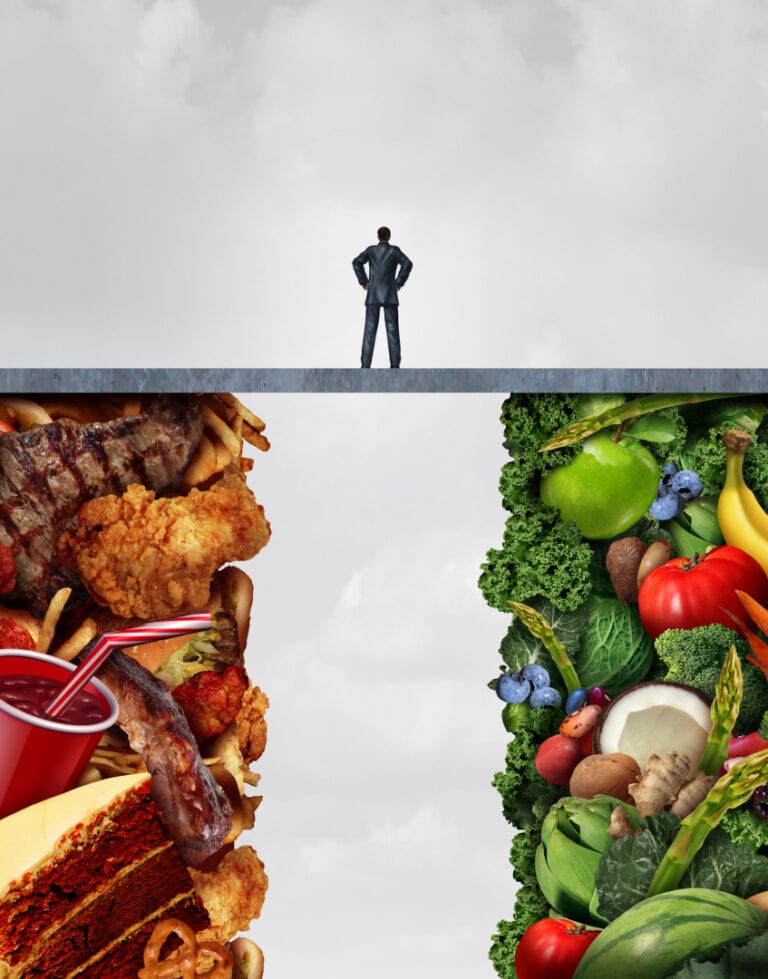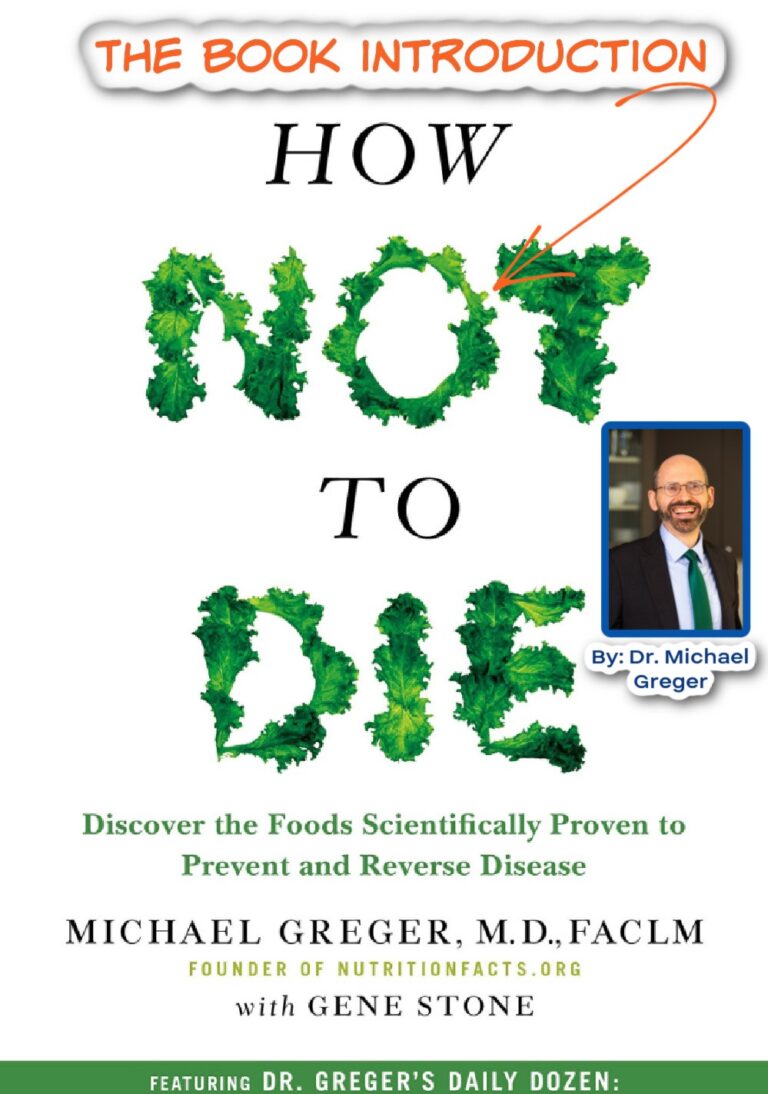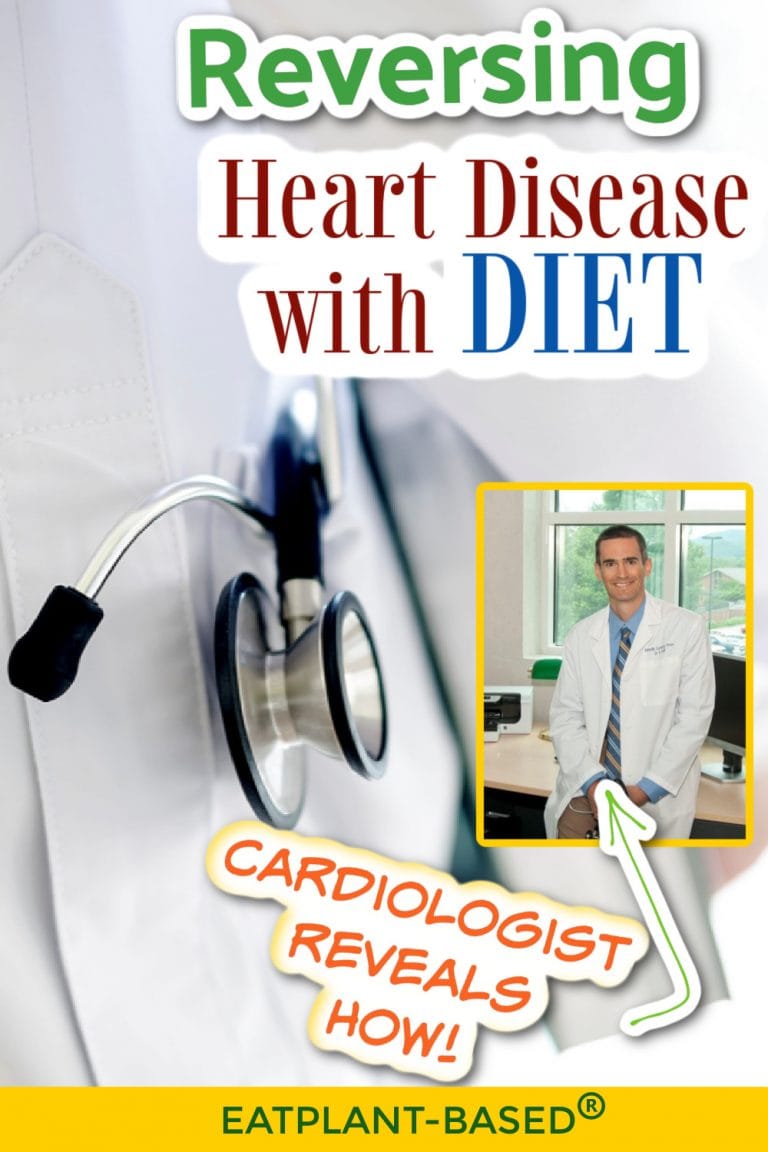The Healthiest Foods to Eat
In this article, T. Colin Campbell, Ph.D., Jacob Gould Schurman Professor Emeritus of Nutritional Biochemistry at Cornell University and author of The China Study, shares his thoughts on why the healthiest foods to eat are plant-based.

Nutrient composition in foods
There are virtually no nutrients in animal-based foods that are not better provided by plants.
Overall, it is fair to say that any plant-based food has many more similarities in terms of nutrient composition to other plant-based foods than it does to animal-based foods. The same is true the other way around; all animal-based foods are more like other animal-based foods than they are to plant-based foods.
For example, even though fish is significantly different from beef, fish has many more similarities to beef than it has to rice. Even the foods that are “exceptions” to these rules, such as nuts, seeds, and processed low-fat animal products, remain in distinct animal and plant “nutrient” groups.
Eating animals is a markedly different nutritional experience from eating plants. The amounts and kinds of nutrients in these two types of foods, shown in this Chart1-4, illustrate these striking nutritional differences.
Chart: Nutrient Composition of Plant- and Animal-Based Foods (Per 500 Calories of Energy)
| Nutrient | Plant-Based Foods* | Animal-Based Foods** |
| Cholesterol (mg) | – | 137 |
| Fat (g) | 4 | 36 |
| Protein (g) | 33 | 34 |
| Beta-carotene (mcg) | 29,919 | 17 |
| Dietary Fiber (mg) | 31 | – |
| Vitamin C (mg) | 293 | 4 |
| Folate (mcg) | 1,168 | 19 |
| Vitamin E (mg_ATE) | 11 | 0.5 |
| Iron (mg) | 20 | 2 |
| Magnesium (mg) | 548 | 51 |
| Calcium (mg) | 545 | 252 |
As you can see, plant foods have dramatically more antioxidants, fiber, vitamins, and minerals than animal foods. In fact, animal foods are almost completely devoid of several of these nutrients–but they have much more cholesterol and fat.
They also have slightly more protein than plant foods, along with more B12 and vitamin D, although the vitamin D is largely added to milk.
Exceptions
Of course, there are some exceptions: some nuts and seeds are high in fat and protein (e.g., peanuts, sesame seeds), while some animal-based foods are low in fat, usually because it is stripped by artificial processing (e.g., skim milk). But if one looks a little more closely, the fat and protein of nuts and seeds are different: they are more healthful than the fat protein of animal foods. They also are accompanied by some interesting antioxidant substances.
On the other hand, processed, low-fat, animal-based foods still have some cholesterol, lots of protein, and very little or no antioxidants and dietary fiber, just like other animal-based foods.
Because nutrients are primarily responsible for the healthful effects of foods, and because of the major differences in nutrient composition between animal-and plant-based foods, isn’t it therefore reasonable to assume that we should expect to see distinctly different effects on our bodies depending on which variety of foods we consume?
What are essential nutrients?
By definition, for a food chemical to be an essential nutrient, it must meet two requirements:
- The chemical is necessary for healthy human functioning.
- The chemical must be something our bodies cannot make on their own, and therefore must be obtained from an outside source.
One example of a chemical that is not essential is cholesterol, a component of animal-based food that is nonexistent in plant-based food. While cholesterol is essential for health, our bodies can make all that we require; we do not need to consume any in food. Therefore, it is not an essential nutrient.
There are four “nutrients” that animal-based foods have that plant-based foods, for the most part, do not: cholesterol and vitamins A, D, and B12. Three of these are nonessential nutrients. Cholesterol our bodies make naturally. Vitamin A our bodies can readily make from beta-carotene, and vitamin D we produce simply by exposing our skin to about fifteen minutes of sunshine every couple of days.
Both of these vitamins are toxic if they are consumed in high amounts. This is one more indication that it is better to rely on the vitamin precursors, beta-carotene and sunshine, so that our bodies can readily control the timing and quantities of vitamins A and D that are needed.
Vegan B12 Sources
Vitamin B12 is more problematic. It is made by microorganisms found in the soil and intestines of animals, including our own. The amount made in our intestines is not adequately absorbed, so it is recommended that we consume B12 in food. Research has shown that plants grown in healthy soil that has a good concentration of vitamin B12 will absorb this nutrient.5 However, in the United States, plants are not a reliable source of B12.

We live in such a sanitized world that we rarely come into direct contact with the soil-borne microorganisms that produce B12. At one point in our history, we may have gotten some B12 from vegetables that hadn’t been scoured of all soil, in addition to any animal food we consumed. Therefore, it is a good assumption that modern Americans who eat highly cleansed plant products and no animal products will not get enough vitamin B12.
Though our society’s obsession with nutrient supplements seriously detracts from other, far more important nutrition information, this is not to say that supplements should always be avoided.
It is estimated that we hold a three-year store of vitamin B12 in our bodies. If you do not eat any animal products, particularly if you are pregnant or breastfeeding, you should take a small B12 supplement regularly and consider getting tested for B12 levels.
If they are on the low side, consider getting confirmatory tests for methylmalonic acid and homocysteine, as well. Likewise, if you never get sun exposure, especially during the winter months, you might wish to take a vitamin D supplement and make more of an effort to get outside.
Another informative article by T. Colin Campbell, PhD, is Understanding Nutrition.
This article is an excerpt from The China Study by guest author, Dr. T. Colin Campbell, Ph.D.
About the author

T. Colin Campbell, Ph.D. has been dedicated to the science of human health for more than 65 years. His primary focus is on the association between diet and disease, particularly cancer. Although largely known for the China Study–one of the most comprehensive studies of health and nutrition ever conducted and recognized by The New York Times as the “Grand Prix of epidemiology”–Dr. Campbell’s profound impact also includes extensive involvement in education, public policy, and laboratory research.
Dr. Campbell grew up on a dairy farm and was the first in his family to go to college, where he studied pre-veterinary medicine at Pennsylvania State University. After obtaining his bachelor’s degree, and while completing his first year at the University of Georgia veterinary school, he received a telegram from a well-known professor at Cornell University, offering a scholarship and research opportunity too good to turn down. And so he completed his education at Cornell University (M.S., Ph.D.) and MIT (Research Associate) in nutrition, biochemistry, and toxicology. He then spent 10 years on the faculty of Virginia Tech’s Department of Biochemistry and Nutrition before returning to Cornell in 1975 where he presently holds his Endowed Chair as the Jacob Gould Schurman Professor Emeritus of Nutritional Biochemistry in the Division of Nutritional Sciences.
Dr. Campbell’s research experience includes both laboratory experiments and large-scale human studies. He has received over 70 grant-years of peer-reviewed research funding (mostly with NIH), served on grant review panels of multiple funding agencies, actively participated in the development of national and international nutrition policy, and authored over 350 research papers, most published in peer-reviewed scientific journals. Throughout his career, he has confronted a great deal of confusion surrounding nutrition and its effects. It is precisely this confusion that he has focused so much on, in recent years.
In order to synthesize the findings of his long and rewarding career, and to give back to the public whose lives are threatened by rampant misinformation and special interests, Dr. Campbell co-wrote The China Study: Startling Implications for Diet, Weight Loss and Long-term Health (2005, 2016), which has sold more than 3 million copies worldwide and has been translated into 50 foreign languages. He is also the author of The New York Times bestseller Whole (2013), The Low Carb Fraud (2013), and The Future of Nutrition. Several documentary films feature Dr. Campbell and his research, including Forks Over Knives, Eating You Alive, Food Matters, and PlantPure Nation. He continues to share evidence-based information on health and nutrition whenever given the opportunity. He has delivered hundreds of lectures around the world and he is the founder of the T. Colin Campbell Center for Nutrition Studies and the online Plant-Based Nutrition Certificate in partnership with eCornell.
Resources for starting a plant-based diet
- What is a Whole Food Plant-Based Diet?
- How to Start a Plant-Based Diet
- Plant-Based Diet Grocery List
- What’s the Difference Between Plant-Based and Vegan?
- WFPB Beginner Guide
- 10 Simple Plant-Based Recipes
- Plant-Based Recipes by Category
Citations
- The Alpha-Tocopherol Beta Carotene Cancer Prevention Study Group. “The effect of vitamin E and beta carotene on the incidence of lung cancer and other cancers in male smokers.” New Engl. J. Med. 330 (1994): 1029-1035.
- U.S. Department of Agriculture. “USDA Nutrient Database for Standard Reference.” Washington, DC: U.S. Department of Agriculture, Agriculture Research Service, 2002.
- Holden JM, Eldridge AL, Beecher GR, et al. “Carotenoid content of U.S. foods: an update of the database.” J. Food Comp. Anal. 12 (1999): 169-196.
- The exact food listings in the database were: ground beef, 80% lean meat/ 20% fat, raw; pork, fresh ground, raw; chick, broilers or fryers, meat and skin, raw; milk, dry, whole; spinach, raw, tomatoes, red, ripe, raw, year-round average; lima beans, large, mature seeds, raw; peas, green, raw; potatoes, russet, flesh and skin, raw.
- Mozafar A. “Enrichment of some B-vitamins in plants with application of organic fertilizers.” Plant and Soil 167 (1994): 305-311.




